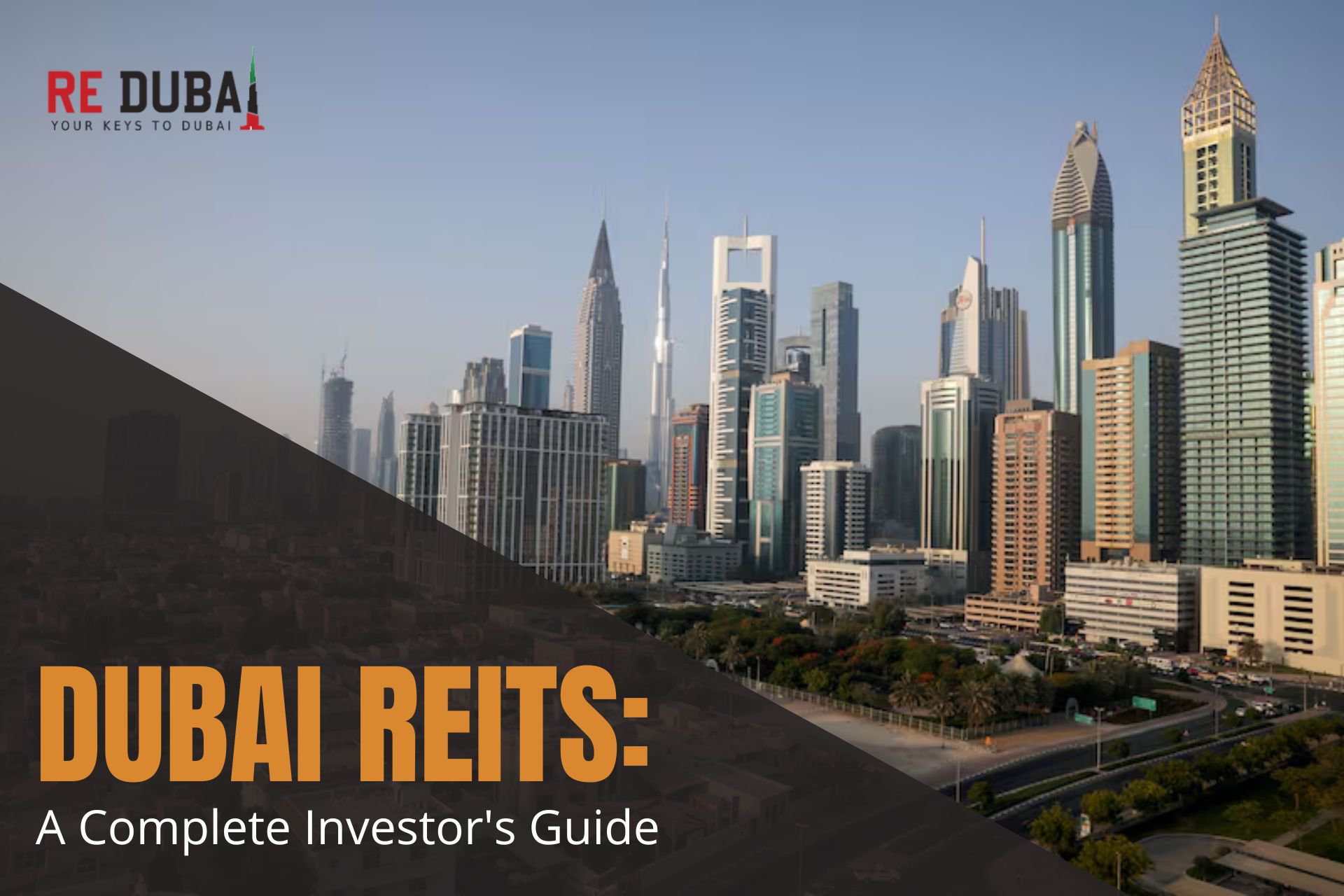Overview of the Growing Popularity of REITs Globally and in Dubai
Real Estate Investment Trusts (REITs) have gained significant traction globally as a preferred investment vehicle, offering a unique combination of liquidity, income, and diversification. As real estate markets continue to evolve, REITs provide investors with opportunities to gain exposure to property assets without the complexities of direct ownership. Dubai, known for its dynamic real estate sector, has embraced this trend, seeing a steady rise in the popularity of REITs among both local and international investors.

Brief Introduction to What REITs Are
REITs are companies that own, operate, or finance income-producing real estate across a range of property sectors. Modeled after mutual funds, REITs pool the capital of numerous investors, allowing individual investors to earn dividends from real estate investments without having to buy, manage, or finance any properties themselves.
What are Real Estate Investment Trusts (REITs)?
REITs
A Real Estate Investment Trust (REIT) is a company that owns, operates, or finances income-generating real estate. REITs are modeled after mutual funds, enabling individual investors to invest in a diversified portfolio of real estate assets. By law, REITs must distribute at least 90% of their taxable income to shareholders as dividends, making them an attractive option for income-focused investors.
Types of REITs
- Equity REITs: These REITs own and manage income-producing properties. Revenue primarily comes from leasing space and collecting rents on the properties they own.
- Mortgage REITs (mREITs): These REITs provide financing for income-producing real estate by purchasing or originating mortgages and mortgage-backed securities. Their revenue mainly comes from the interest earned on the mortgage loans.
- Hybrid REITs: These combine the investment strategies of both equity REITs and mortgage REITs, owning properties and holding mortgages.
The Dubai REIT Market
The Dubai REIT market has seen substantial growth, driven by the emirate's robust real estate sector and its strategic position as a global business hub. The introduction of REITs in Dubai has provided a structured and regulated investment avenue for those looking to benefit from the city’s real estate boom without direct ownership complexities.

Key Players and Major REITs in Dubai
Some of the key players in the Dubai REIT market include:
- Emirates REIT: The first and largest listed Sharia-compliant REIT in the UAE.
- ENBD REIT: Another prominent REIT focusing on a diversified portfolio across the commercial, residential, and industrial sectors.
Market Performance and Trends
The Dubai REIT market has shown resilience and growth potential, characterized by increasing investor interest and the introduction of new REITs. Trends indicate a growing preference for income-generating assets and diversification across various property sectors.
Benefits of Investing in REITs
Diversification of Investment Portfolio
Investing in REITs allows investors to diversify their portfolios with real estate assets, which can reduce the overall risk associated with market volatility. By spreading investments across different property types and geographic locations, REITs provide a buffer against sector-specific downturns and enhance portfolio stability.
Regular Income Through Dividends
REITs are required by law to distribute a significant portion of their taxable income as dividends to shareholders. This requirement ensures that investors receive regular income distributions, making REITs an attractive option for those seeking steady, reliable income streams. The consistency of these payouts can be particularly appealing in low-interest-rate environments.
Liquidity and Accessibility
Unlike direct real estate investments, which can be illiquid and require substantial capital, REITs are traded on major stock exchanges. This trading mechanism offers greater liquidity, allowing investors to buy and sell shares with relative ease. Additionally, the accessibility of REITs makes them an ideal investment vehicle for those who wish to invest in real estate without the hassle of property management and maintenance.
Potential for Capital Appreciation
REITs provide the potential for capital appreciation through the increase in property values and the effective management of real estate assets. As the properties within a REIT's portfolio appreciate over time, the value of the REIT's shares can increase, offering investors the possibility of capital gains in addition to regular dividend income. Effective asset management strategies, such as property upgrades and strategic acquisitions, can further enhance the value of the REIT's holdings, contributing to overall investment returns.
How to Invest in REITs in Dubai

Steps to Start Investing in Dubai REITs
- Research and Selection: Investigate the available REITs in Dubai, focusing on their performance, portfolio, and management.
- Open an Investment Account: Choose a brokerage or investment platform that offers access to Dubai REITs.
- Fund Your Account: Deposit the required funds into your investment account.
- Purchase REIT Shares: Buy shares of the selected REITs through the investment platform.
Requirements and Eligibility
To invest in Dubai REITs, individuals typically need to meet the following criteria:
- Valid Investment Account: Investors must have an active investment account with a recognized financial institution or brokerage firm.
- Compliance with Local Regulations: Investors must adhere to the regulatory requirements set by the Dubai Financial Services Authority (DFSA) and other relevant bodies. This includes understanding and complying with any specific rules pertaining to REIT investments.
- Minimum Investment Amounts: Each REIT or brokerage platform may have its own minimum investment thresholds. Prospective investors should be aware of these requirements to ensure they meet the necessary financial criteria.
Platforms and Brokers for Investing in REITs
A variety of platforms and brokers facilitate investment in Dubai REITs, catering to different investor needs and preferences. These include:
- Local Banks: Many local banks in Dubai offer REIT investment options as part of their wealth management services. They provide a trusted and familiar avenue for local investors.
- International Brokerage Firms: Renowned international brokers offer access to Dubai REITs, providing global investors with the opportunity to diversify into the Dubai real estate market. These firms often offer comprehensive research and advisory services.
- Online Trading Platforms: Online platforms provide a convenient and accessible way to invest in Dubai REITs. These platforms offer user-friendly interfaces, real-time trading capabilities, and lower fees, making them an attractive option for tech-savvy investors.
Top REITs in Dubai to Consider
Detailed Profiles of Top-Performing REITs in Dubai
- Emirates REIT: Known for its diversified portfolio including commercial, educational, and retail properties. It offers strong dividend yields and has shown consistent performance.
- ENBD REIT: Focuses on a mix of asset classes, providing a balanced approach to real estate investment with competitive returns and a stable income stream.
Performance Metrics and Investment Highlights
- Emirates REIT: High occupancy rates, strong dividend payouts, and strategic acquisitions.
- ENBD REIT: Diversified asset base, consistent rental income, and proactive asset management.
Risks and Considerations
While REITs offer a compelling entry point to real estate investment, it's important to understand the potential risks involved:
- Market Risk: General fluctuations in the real estate market can impact REIT performance. A downturn in the market could lead to falling property values within the REIT's portfolio, decreasing overall value and potentially leading to share price declines.
- Interest Rate Risk: REITs, particularly mortgage REITs (mREITs), are sensitive to interest rates. Rising interest rates can make it more expensive for REITs to borrow money, affecting their profitability. Additionally, higher interest rates might make bonds a more attractive investment option for some investors, leading to decreased demand for REITs and potentially lower share prices. For example, if interest rates rise significantly, mREITs that hold mortgages with fixed interest rates may see a decline in their profit margins, impacting their ability to pay dividends.
- Management Risk: The performance of a REIT is heavily influenced by the decisions of its management team. Poor investment choices, inadequate maintenance of properties, or ineffective management strategies can negatively impact the REIT's profitability and share value. Carefully researching the management team's track record and experience is crucial before investing in a REIT.
Mitigating Risks
Here are some strategies to mitigate these risks:
- Diversification: Invest in a variety of REITs across different property sectors (residential, commercial, office, etc.) and geographic locations. This helps spread risk and reduces the impact of a downturn in any one sector or market.
- Research: Conduct thorough research on the REITs you're considering, including their financial performance, portfolio composition, and management team.
- Monitor Market Trends: Stay informed about real estate market trends, economic indicators, and interest rate movements. This awareness can help you make informed investment decisions.
Comparing REITs to Direct Real Estate Investment
Pros and Cons of REITs vs. Direct Property Investment
Pros of REITs:
- Greater liquidity: REITs offer easy buying and selling of shares on the stock market, providing liquidity compared to direct property ownership.
- Lower entry costs: Investing in REITs requires less capital upfront than buying physical properties, making it accessible to a wider range of investors.
- Professional management: REITs are managed by experienced professionals, handling property management and operations.
- Diversification: Investors gain exposure to diversified real estate portfolios, reducing risk compared to owning a single property.
Cons of REITs:
- Limited control: Investors have less control over specific properties within the REIT's portfolio compared to direct ownership.
- Market volatility: REITs can be affected by market fluctuations, economic conditions, and investor sentiment, impacting share prices and returns.
Situations Where REITs Might Be More Advantageous
REITs are particularly advantageous for investors seeking exposure to real estate without the complexities of property management, those looking for liquidity, and those interested in diversified real estate exposure with smaller capital outlay.

Recap of the Benefits and Considerations of Investing in Dubai REITs
Investing in Dubai REITs offers numerous benefits, including portfolio diversification, regular income, liquidity, and potential capital appreciation. However, it is essential to be aware of the associated risks and conduct thorough research before investing.
Encouragement to Explore REITs as a Viable Investment Option
Given the structured and regulated environment of Dubai’s REIT market, coupled with the city’s robust real estate sector, exploring REITs can be a viable and rewarding investment option for both local and international investors. This Dubai REITs guide serves as a starting point for anyone interested in investing in Dubai REITs.
For more insights and in-depth information about investing in Dubai's vibrant real estate market, be sure to visit Redubai for comprehensive guides, market updates, and investment opportunities tailored to both local and international investors.




